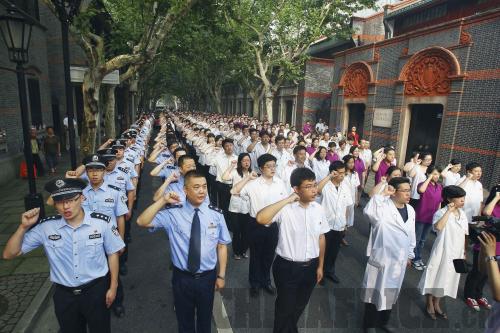|
 |
|
TAKING VOWS: New CPC members pledge their allegiance before the Memorial House of the First National Congress of the CPC in Shanghai on July 1 (CAI WEISHUAI) |
As the 11th Beijing Municipal Congress of the Communist Party of China (CPC) came to a close on July 3, China finished re-electing its Party leaders at the provincial level.
Out of the 31 provinces, autonomous regions and municipalities, Beijing was the last to reshuffle its municipal Party committee, after the Liaoning Provincial Party Committee took the lead in October last year.
China began to re-elect its Party committee secretaries and members at the township, county, city and provincial levels last year.
Along with the changes of local Party committees, delegates are also elected to attend the coming 18th CPC National Congress later this year. Sixty-four delegates of Beijing were elected during the 11th Beijing Municipal Congress of the CPC.
Beijing elected its congress after 28 of the 40 electoral units for the national congress finished their elections, including 24 provincial units and four units at the central government level.
A total of 2,270 delegates were elected from 82.4 million CPC members by 40 electoral units across the country. The number is 50 more than that to the 17th National Congress of the CPC five years ago.
The delegates are required to be Party members with outstanding political performance and have close ties with society, according to the CPC Central Committee.
Prelude to the congress
The latest re-election of Party leaders, which produced 404 leadership members for the standing committees of the CPC provincial committees in the 31 provinces, municipalities and autonomous regions on the Chinese mainland, brought onboard many officials who were younger and well-educated.
According to a report by People's Daily, among the selected provincial-level Party committee members, 118 were born in the 1960s, accounting for 29.28 percent of the total number.
"The age distribution is in line with our country's cadre promotion system, according to which provincial-level officials are supposed to be around 50," said Gong Weibin, a professor at the Chinese Academy of Governance (CAG).
The standing committees of the CPC Xinjiang Uygur and Tibet autonomous region committees have the largest number of leaders born in the 1960s, with seven each. Normally, the standing committee of a provincial committee has 13 leaders in total.
Wang Yukai, another professor with the CAG, said the difficulties and challenges that younger officials face in ethnic regions can help improve their decision-making abilities.
Zhang Xin, an associate professor of public management at Renmin University of China, said a younger leadership might be a competitive advantage when facing future challenges.
"Younger officials are quick in learning and adapting to the rapidly changing environment. That is essential for advancing the country's reform efforts. They are expected to spearhead some experimental programs in that regard," Zhang said.
Liang Yanhui, a professor at the Party School of the CPC Central Committee, said the increasing number of leaders born in the1960s could bring forth more innovative ideas.
Meanwhile, 74.4 percent of the 404 standing committee members of provincial-level Party committees hold master's degrees and 24 percent hold bachelor's degrees.
Most noticeably, seven out of the 13 members of the Standing Committee of the CPC Tianjin Municipal Committee hold doctorate degrees in management, economy, law or liberal arts.
"Undoubtedly, the trend is that more advanced degree holders from top universities will bring their expertise into management," said Wang Guixiu, another professor at the Party School of the CPC Central Committee.
|